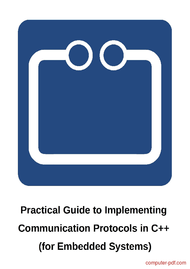Implementing Communication Protocols in C++
Implementing communication protocols in C++ presents a unique challenge that blends low-level bit manipulation with high-level software architecture. While the fundamental task of serializing and deserializing structured messages appears straightforward, real-world protocol implementations often grow into unwieldy codebases that resist modification and expansion. This guide addresses these pain points by presenting a modern C++ design philosophy that leverages template metaprogramming, type-safe interfaces, and declarative syntax to create protocol implementations that are both maintainable and extensible. The approach is particularly valuable for developers working on IoT devices, automotive systems, financial networks, or any domain where binary protocols evolve over time.
Learning the Implementing Communication Protocols in C++
The book begins by analyzing common protocol implementation pitfalls, including brittle parsing code, unsafe type conversions, and the "protocol sprawl" that occurs when ad-hoc solutions accumulate. Through concrete examples, it demonstrates how traditional procedural approaches lead to code duplication and subtle bugs when handling variable-length fields, checksums, or network byte order. The guide then introduces its generic architecture built around C++11/14 features, showing how concepts like template specialization, constexpr functions, and SFINAE can create self-describing protocol definitions. This foundation allows new message types to be added through declaration rather than imperative code, significantly reducing boilerplate while maintaining type safety.
A core innovation of the approach is its layered design pattern, which cleanly separates protocol concerns into discrete components: message definition, serialization policies, transport encapsulation, and error handling. The guide demonstrates how to implement each layer using modern C++ idioms, such as CRTP for static polymorphism and tag dispatch for algorithm selection. Particularly valuable is the treatment of endianness-agnostic serialization, showing how to write protocol code that works seamlessly across ARM, x86, and embedded architectures without platform-specific branches. The architecture naturally accommodates both simple fixed-format protocols and complex stateful ones with variable-length payloads.
For performance-critical applications, the book provides zero-copy serialization techniques and memory pool strategies that minimize allocations in hot paths. It contrasts various approaches to protocol versioning, demonstrating how to design forward-compatible formats that can evolve without breaking existing implementations. The guide also covers validation strategies, from compile-time checks on message sizes to runtime verification of field constraints, helping prevent malformed packets at their source rather than through expensive error recovery.
Practical considerations permeate the text, including testing methodologies for protocol implementations and debugging techniques for network-level issues. A dedicated section shows how to integrate the generic protocol library with common transport layers (TCP, UDP, serial) and framing mechanisms (COBS, HDLC). The examples progress from basic request-response patterns to complex state machine-based protocols, all while maintaining the core design's clarity and type safety.
What sets this resource apart is its balance between theoretical robustness and practical applicability. The presented architecture has been battle-tested in production environments handling thousands of distinct message types, proving that elegant C++ designs can scale to real-world complexity. For teams maintaining legacy protocol codebases, the guide offers migration strategies to incrementally adopt these patterns. Whether you're designing a new protocol from scratch or wrestling with an aging implementation, these insights will transform how you approach networked communication in C++, yielding code that's faster to develop, easier to maintain, and more resilient to change—qualities that become increasingly valuable as protocols inevitably grow and evolve.
| Description : | Download Practical Guide to Implementing Communication Protocols in C++ Language (for Embedded Systems), ebook made by Alex Robenko. |
| Level : | Advanced |
| Created : | August 4, 2017 |
| Size : | 796.62 KB |
| File type : | |
| Pages : | 189 |
| Author : | Alex Robenko |
| Licence : | Creative commons |
| Downloads : | 2829 |
